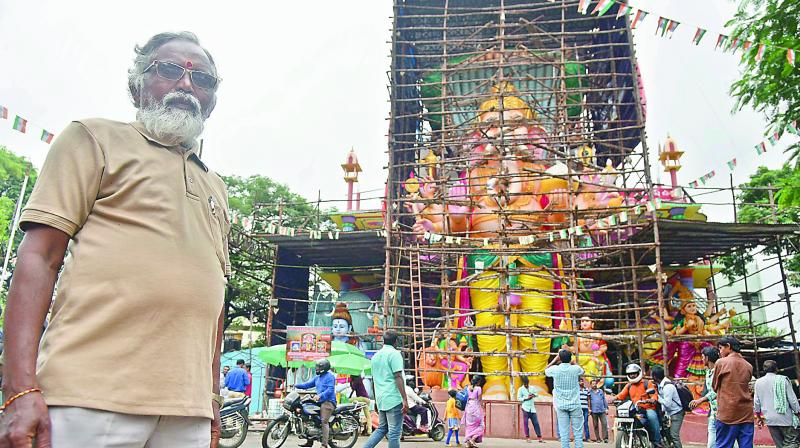Idol hands
Chinnaswamy Rajendran has been sculpting the famous Khairatabad Ganesha idol since 34 years.

Khairatabad sees devotees trickling in from the two Telugu states to have just one look at the Ganesha idol. However, rarely do they know the man behind it. Born in Tamil Nadu, Chinnaswamy Rajendran moved to Hyderabad in 1982. He says, “I first sculpted an idol in 1978 and it was 14-feet tall. One of my friends evinced interest to make the Khairatabad Ganesha. He approached me when I was working in Ramakrishna Studios for the film Dana Veera Soora Karna. They were impressed with my work and I got associated with the project. Since then, barring a few years, I have been sculpting the idol every year.” Rajendran’s 1982 Yeluka (rat) Ganesha became so famous that it caught director K. Vishwanath’s attention too. He shot a few scenes of Kamal Haasan dancing in front of the idol in Sagara Sangamam.
Soon, NTR was captivated with his work and started introducing him to everyone as ‘Do you know who is he? He’s the sculptor of Khiratabad Ganesh idol’. “NTR believed in my work and entrusted me with the responsibility of designing his house as well. He even asked me to design the interiors for his proposed museum in Banjara Hills. He wanted his Duryodhana statue to be sculpted in the museum. He asked me to click him (as he posed like Dhuryodhana), and engrave the photo on the statue. The next morning, I called him for a clarification, but I found out that he passed away,” he says.
Life took a different turn after he survived two major accidents in 2000. “They strengthened my belief in the Lord and I became more spiritually inclined. I started sculpting the idol with more dedication. Now, I earmark three months for the preparation of the festival and do not take up other assignments. During this period, I eat once a day and don’t consume non vegetarian food. I take whatever they pay,” he says.
Rajendran consults Siddhanthi Vittala Sharma to finalise the design. He says, “This year, the 60 feet idol is called Sri Chandi Kumara Anantha Maha Ganapathi, which signifies happiness and prosperity. Iron (25 tonnes), Plaster of Paris (34 tonnes) from Tamil Nadu, coconut coir (30kgs), gunny cloth (20,000 meters) and water colours have been used to sculpt.”
